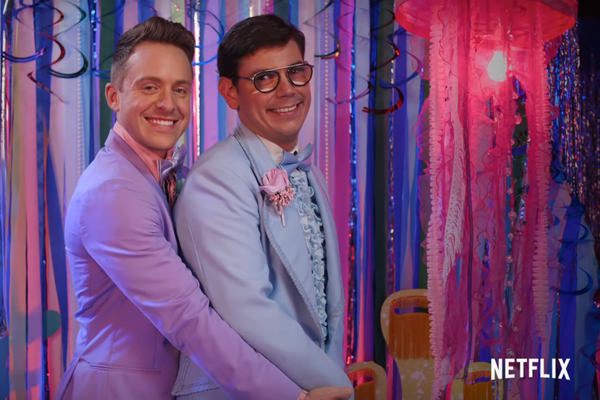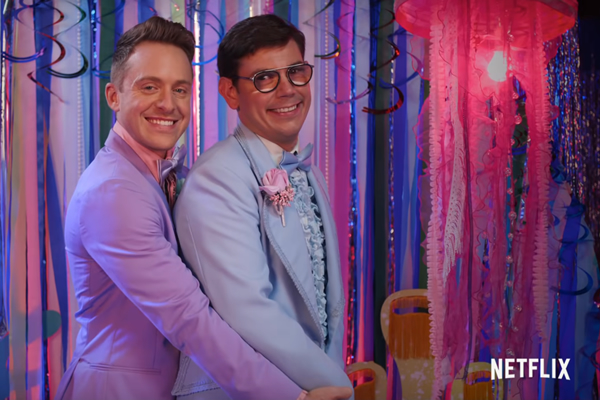

If you’re queer and disabled, you’re almost more likely to view a total eclipse than you are to see anyone like you on TV.
I’m lesbian and legally blind. Nearly one in five people in this country has a disability, according to the U.S. Census Bureau. There are LGBTQ, disabled people just as there are hetero folks with disabilities.
Yet, I’m shocked (in a “have I won the lottery?” way) whenever someone queer and disabled appears on screen.
This summer, there’s good news for LGBTQ and disabled folks.
“Special,” the four-time-Emmy-nominated series, created, written by, and starring Ryan O’Connell, is now streaming on Netflix in its second and final season. Based on O’Connell’s 2015 memoir “I’m Special and Other Lies We Tell Ourselves,” the series is the story of a gay man with cerebral palsy.
Jim Parsons (of the “Big Bang Theory”), along with O’Connell, is executive producer of the show. This season, “Special” has been expanded from 12-17 minutes to 30 minutes per episode.
The character Ryan in “Special” is a younger, less experienced, avatar of O’Connell.
In season 1 of “Special,” Ryan gets a job as a writer at an internet start-up and moves out on his own. He had been living with Karen, his mom (Jessica Hecht). He’s become best friends with his co-worker Kim (Punam Patel) and lost his virginity to a caring sex worker.
Season 2 of “Special” has a “Sex and the City” vibe. Ryan is estranged from his mother. He’s having lots of sex. He loves Tanner (Max Jenkins) who’s in an open relationship with Richard. But, there’s chemistry between him and Henry (Buck Andrews) who’s neurodivergent.
The characters in “Special” seem privileged. But they have concerns. Kim struggles to pay her rent and navigate her love life. Karen must learn to care for herself after caring for Ryan for years. Ryan worries that he’s brought “trash wine” to a fancy dinner.
There are some non-disabled people of color on the show — most notably, Patel. Some of the supporting actors are disabled. But I wish there were some disabled characters of color on “Special.”
Yet, “Special,” though a comedy, depicts what life is often like if you’re queer and disabled. Take two stories from my life:
One evening, my date and I were at a restaurant. “Watch her! She might fall!” a stranger said as I walked toward the restroom. “I do and I enjoy it!” my girlfriend said.
Once, a woman at a gay bar told me I was “inspirational.” What had I done that was so inspiring? I’d sipped a beer.
Disabled people call this “inspiration porn.” If you do porn, it’s not the good porn.
I tell you these stories because many disabled and queer people have had such encounters.
“Special” makes the sexiness, queerness, brattiness, resilience, romance and street cred of disabled, queer life up close and personal.
It depicts us as three-dimensional human beings.
Filmmaker Dominick Evans directs FilmDis, a group that monitors disability representation on television. “Our research shows that multiple marginalized disabled people are rarely represented,” Evans, who is trans, non-binary and queer bisexual as well as multiply disabled, emailed me.
“Out of 250 television shows airing between 2019 and 2020, we found 1,198 disabled characters, but only 71 of those were also LGBTQIA,” he added.
It’s even worse for Black and Brown LGBTQIA disabled characters, Evans said.
Thankfully, things are improving. “Disability representation is getting better,” Beth A. Haller, co-editor of The Routledge-Companion to Disability & Media, emailed me.
For instance, “Everything’s Gonna Be Okay,” the American sitcom created by Australian, queer comedian Josh Thomas and streaming on Hulu, has two autistic actors as the leads, Haller said.
Thomas’ boyfriend on the show is a Black man with a Deaf father, Haller added.
More disability representation on TV can’t come soon enough. I can’t wait to see more of our queer, disabled stories.
Kathi Wolfe, a writer and a poet, is a regular contributor to the Blade.